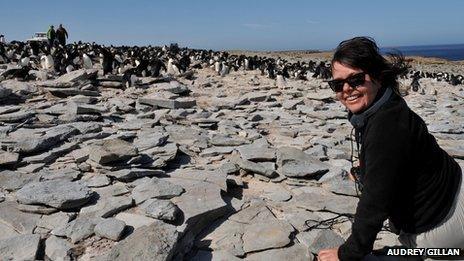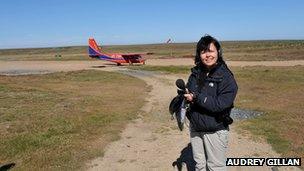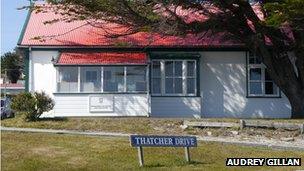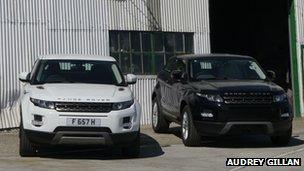Life on the Falkland Islands: Pioneers and Penguins
- Published

Reporter Audrey Gillan at a Falklands penguin colony
Thirty years after the Falklands conflict, <link> <caption>journalist Audrey Gillan finds the islands are prospering</caption> <url href="http://www.bbc.co.uk/programmes/b01h788n" platform="highweb"/> </link> . However, many residents still live in fear of an Argentine invasion.
Before 1982, the economy of the islands, which lie about 300 miles off the coast of South America, was heavily dependent on wool production.
However, a thriving international trade in fishing and income from tourism has transformed the Falklands and the fortunes of its 3,000 residents.

Audrey Gillan on the Falkland Islands
Signs of prosperity can be seen in the new roads and buildings of Stanley, the main town.
The fish of the south Atlantic are very valuable, especially the 'white gold' of squid, which is sold on the international market to Japan and Europe.
In 1986, the Falklands government introduced a fishing zone and sold lucrative licences, leading to the creation of the so-called 'squid-illionaires'.
"The squid is the basis of our fishery," said Stuart Wallace of Fortuna Fishing, whose family are from Dundee.
"The revenue from fishery comes in and has been the mainstay of the economy for the past 25 years.
"I believe it is responsible even now for 60% or 70% of our GDP."
In the summer months, thousands of visitors pour from cruise ships on to the streets of Stanley.
"It's all penguins here: waddling, quacking, battery-operated penguins, cufflinks, hats, socks, T-shirts, even full sized penguin suits," said Gillan. "The tourists can't get enough."
New income source
Another potential source of income for the isles could be offshore oil exploration, with workers from Scotland, Canada and Norway now on 28-day rotations.
"We've had a rig here, drilling, for 22 months now," said Phyllis Rendell, former director of mineral resources for the Falklands.
"Fortunately, we've had some success out there and we've got the potential for commercial production in the coming years."
Since the start of the current oil exploration and the re-election of Cristina de Kirchner as president of Argentina, the dispute over the sovereignty of the Falkland Islands has escalated once again.
1982 Memories
Increasing tensions between the islands and Argentina have reminded many residents of the 1982 conflict.

The street was renamed in honour of UK prime minister Margaret Thatcher
Argentine troops invaded the Falkland Islands on 2 April 1982. Following the dispatch of a 'task force' from Britain, the Argentine garrison surrendered on 14 June.
The fighting cost the lives of three islanders, 655 Argentine and 255 British servicemen.
The war memorial, a large granite monument embossed in gold, sits on the edge of town in front of Thatcher Drive.
The street was renamed in honour of the UK prime minister who took forces into the conflict.
Mr Wallace, who after his family returned briefly to Dundee has lived on the Falklands since 1958, was arrested when the Argentines invaded 30 years ago.
He was held at Fox Bay East with 14 other residents for about six weeks.
"I was told it was for our own good. There were elements within the Argentine military who wished us ill."
Mr Wallace's wife Lillian is from Argentina.
She insisted on going with her husband and taking her two young children.
"To be fair Lillian brow-beat them into letting her come with me," he said.
"It was very flattering."
Lisa Watson, editor of Penguin News, the Falkland Islands weekly newspaper, was a child at the time of the invasion.

New 4x4 vehicles on garage forecourt are a sign of greater prosperity on the islands
She remembers the Governor's announcement that there would be no school the next day as an Argentine aircraft carrier and other ships were seen approaching the islands.
Her grandmother woke her up, saying: "We need to go downstairs. The shooting's started, Lisa."
Immediately after the war, she remembers being intimidated by sounds of aircraft, helicopters and loud bangs.
Even today, if strange noises are heard during the night, the first thing many residents think is that the islands are again being invaded.
Air travel on the 8,000 mile journey from the UK to the Falklands is a 20-hour 'airbridge' civilian flight from RAF Brize Norton in Oxfordshire, costing £2,200.
Costs of air freight and disputes over airspace can lead to high prices in the shops.
A single sweet potato can cost £6.66 in the local provisions store. Often substitutes have to be found for staples such as eggs or potatoes.
Gardner Fiddes, originally from Grangemouth, is chief fire officer on the Falklands.
Because of the soaring prices, he now grows vegetables at home.
"We lost the sun room and gained a greenhouse," he said.
Fish regularly features on local menus.
While locally-bred and slaughtered meat is cheap and plentiful.
Despite the problems and ongoing diplomatic tensions, many Falklanders such as Lisa Watson, find the way of life is unique.
"When I'm away I feel like I'm living someone else's life," she said.
"It doesn't seem quite right."
' <link> <caption>Pioneers and Penguins: Life in the Falklands - BBC Radio Scotland on Monday 30 April and 7 May 1405-1430.</caption> <url href="http://www.bbc.co.uk/programmes/b01gw3b8" platform="highweb"/> </link>